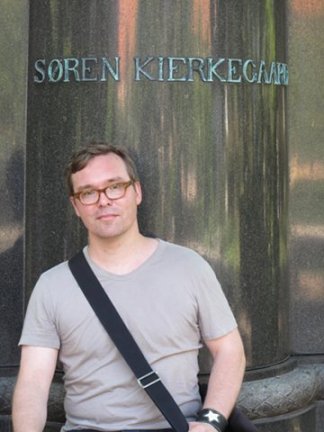 Today is the two-hundredth birthday of Søren Kierkegaard. It’s hard to grasp that. This man, this singular man and thinker has been more influential upon my thinking and sense of self and understanding of the world than any other person. In fact, it’s difficult to say much about him and his influence, it is so entirely pervasive. I have not read nearly enough of his formidable corpus of work and what I have read, I haven’t read it carefully and deeply enough that I don’t feel I am competent to explain very much. I’m not a Kierkegaard scholar and I know he would hate for any of us to call ourselves “Kierkegaardian.” But here we are, in 2013, with 200 years of a very influential man’s ideas and words embedded deep within us, whether we know it or not. The rise of Existentialism in the twentieth century exemplified the anxiety, dread, and uncertainty of the age. Albert Camus and Karl Barth both were deeply indebted to him. War brought uncertainty. Kierkegaard offered a kind of salve. And after the war, more uncertainty still. And Kierkegaard grew in influence.
Today is the two-hundredth birthday of Søren Kierkegaard. It’s hard to grasp that. This man, this singular man and thinker has been more influential upon my thinking and sense of self and understanding of the world than any other person. In fact, it’s difficult to say much about him and his influence, it is so entirely pervasive. I have not read nearly enough of his formidable corpus of work and what I have read, I haven’t read it carefully and deeply enough that I don’t feel I am competent to explain very much. I’m not a Kierkegaard scholar and I know he would hate for any of us to call ourselves “Kierkegaardian.” But here we are, in 2013, with 200 years of a very influential man’s ideas and words embedded deep within us, whether we know it or not. The rise of Existentialism in the twentieth century exemplified the anxiety, dread, and uncertainty of the age. Albert Camus and Karl Barth both were deeply indebted to him. War brought uncertainty. Kierkegaard offered a kind of salve. And after the war, more uncertainty still. And Kierkegaard grew in influence.
I discovered Kierkegaard through Camus. A high school friend tangentially introduced me to Camus, though it was probably because of his love of The Cure’s “Killing an Arab” and a particular kind of Mod posturing more than any else. We never spoke about The Stranger, really. My entrance into existentialism was more roundabout than most. I read about it more than any actual philosophical texts. During my sophomore and junior years, I was devouring Vonnegut and various classic dystopian novels in my north central Texas high school library. Formative, yes. But in fiction. I was starting to wrestle matters of Christianity and there was the ever-present ennui and frustration of adolescence. I read about Camus and discovered Kierkegaard. And that was it, really. I found not an answer, but a fellow traveler – a very articulate, transgressive one.
But I walked around Kierkegaard (I think he would chuckle about that, knowing his penchant for perambulation and indirect communication) for years, reading about him more than his actual work. I didn’t feel I was ready. I read bits and pieces until I finally read Fear and Trembling in its entirety during my junior year of university. And that was when I found my actual grammar, vocabulary, and rhetoric. That was when things got infinitely better, and infinitely worse.
The genie was out of the bottle. There was no turning back. Kierkegaard had sat down in the chair across from me and, with a sly look in his eye and a wry grin on his lips, had laid out a wide array of utensils and instruments. Despair, anxiety, hope, love, truth, and faith. This was my new meal. The task was now how to cut, analyze, and digest all of this.
Kierkegaard got me into theology as an academic discipline and I have my career path because of him. But probably more than anything else, he provided the reassurance that what I was (and still am) going through is, indeed, a good thing. Melancholia is not sin. And the self-deceivers are those true-believers of ideologies, religious and otherwise. They are the sinners. They are those who live in bad faith, Sartre’s or otherwise. They commit the sin of hubris. And Kierkegaard attacks them, whether it be the official Lutheran church of the Danish State, or the Copenhagen press, or the Hegelians. He attacks them. Mercilessly.
And it is God who he loves and cannot fathom. It is a paradox, an absolute paradox. He desires to be a Knight of Faith and can only wonder at Abraham. He knows that Purity of Heart is to Will One Thing. Kierkegaard, in all his angst and frustration and working out of his salvation in fear and trembling makes the path easier, because he points, poetically so, a rhetorical direction of working through one’s own path toward Mt. Moriah. He points out that there is a secret that he cannot tell and and cannot explain and he points out that each individual must go their own way. He helps us by writing that ultimately, he cannot help us. We must go on, ourselves.
So, today is a special day. And I am pleased to celebrate it with a toast of Danish aquavit and maybe some hard bread and herring.
And maybe a little prayer in thanksgiving for the Melancholy Dane.





